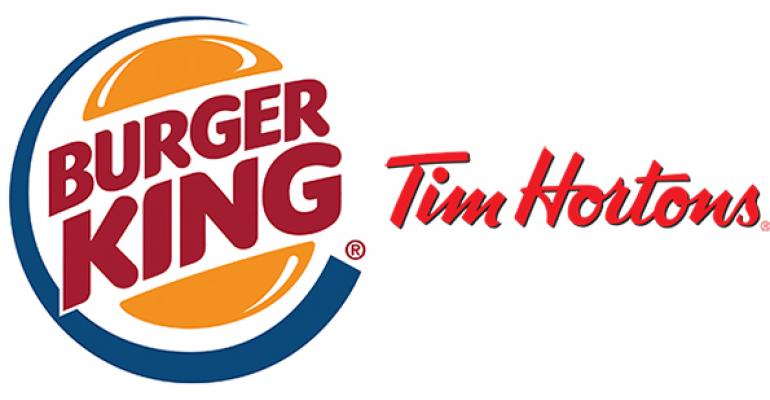Both Burger King and Tim Hortons continue to generate strong sales and new unit development in the third quarter, but don’t expect parent company Restaurant Brands International Inc. to add another brand anytime soon.
Speaking on the company’s third quarter earnings conference call on Tuesday, Restaurant Business International Chief Financial Officer Josh Kobza said the company has plenty of growth potential with its two chains without adding a third.
“We have two fantastic brands,” Kobza said. “We’re happy with our two brands. They have years of growth and value creation. We have no interest at this point in thinking about any M&A.”
The two chains were combined a year ago when Burger King’s controlling shareholder, 3G Capital, acquired the Canadian doughnut and coffee concept Tim Hortons. Sales of both brands have been strong in the quarters since, and on Tuesday Restaurant Brands International touted development milestones for both concepts.
At Burger King, same-store sales rose 6.2 percent worldwide, including 5.2 percent in the U.S. and Canada as the burger chain continued to gain market share in a competitive industry.
RBI’s CEO Daniel Schwartz said that the chain’s sales increased in all of its major markets.
Burger King’s domestic same-store sales success came even though the company has passed the one-year anniversary of its reintroduction of Chicken Fries — a reintroduction given significant credit for igniting Burger King’s sales at this time last year. The company said that Fiery Chicken Fries, a limited-time offshoot of that product, along with the Extra Long Jalapeno Cheeseburger helped the chain maintain momentum despite tougher comparisons.
“We’re obviously pleased with our performance,” Schwartz said.
Burger King’s major growth will come from unit development, and the burger quick-serve has added 2,000 restaurants since the beginning of 2011 — shortly after 3G Capital bought the chain and accelerated international development.
Executives on the call highlighted Burger King France’s planned acquisition of hamburger chain Quick, and said the acquisition highlights the chain’s ability to rapidly accelerate development.
Burger King left France in the late 1990s but returned there through a joint venture partnership with Groupe Bertrand in 2013 and operated 26 restaurants there through late September. Burger King has flourished upon its return — average unit volumes have averaged 5 million Euro, Kobza said, or about $5.5 million.
Quick has more than 500 locations, mostly in France. Burger King France will convert those Quick restaurants, which will rapidly give Burger King a major presence in the country. “We’re building our pipeline for years to come,” Kobza said.
Restaurant Brands International sees similar potential at Tim Hortons, which reported 5.3-percent same-store sales growth in the third quarter, executives said.
Tim Hortons dominates in Canada, but has historically struggled to develop elsewhere in the world. 3G Capital vowed to accelerate that development during the acquisition last year, and company executives said that plan is starting to bear fruit.
Earlier this month, RBI announced a 150-unit development deal in the Cincinnati market with Seven Invest, a company that owns hotels and tourist businesses in Latin America. It was the first major development agreement that Tim Hortons signed since the acquisition, Schwartz said.
Executives hinted they have other deals in the works around the globe, and believe the company has the potential to increase in size that is similar to Burger King.
“This demonstrates our commitment to expand Tim’s presence in the U.S.,” Schwartz said. “And it highlights our expansion model to increase the pace of development.”
The area development system is a big shift for Tim Hortons, which in Canada, and early in its U.S. development, relied on small-scale operators in a system in which the franchisor controlled real estate. More recently, the company has started using area development deals with large-scale franchisees to accelerate development in the U.S. and other parts of the world outside of Canada.
Executives are hoping to generate the same sales growth at Tim Hortons that they’ve been able to achieve at Burger King — though both appear to be growing at a decent clip.
Burger King’s systemwide sales in the third quarter, factoring out the impact of foreign exchange rates, increased 11.2 percent in the third quarter. At Tim Hortons they increased 8.2 percent.
Contact Jonathan Maze at [email protected].
Follow him on Twitter at @jonathanmaze





